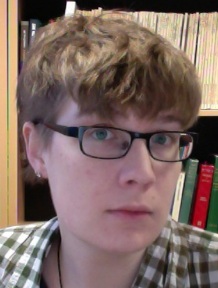Caitlin Light
Lecturer
Visit Caitlin Light 's profile on the York Research Database to:
- See a full list of publications
- Browse activities and projects
- Explore connections, collaborators, related work and more
Profile
Biography
Caitlin Light performs research in diachronic syntax, focusing in particular on the history of the English language and its closest relatives. Much of her research focuses on information structure and the syntax-pragmatics interface, and on how our understanding of these issues may be strengthened by the use of diachronic parsed corpora and large-scale comparative studies. After receiving her BA at the University of Michigan in Ann Arbor, she completed her PhD in Linguistics at the University of Pennsylvania in 2012. She was appointed a Lecturer in English Language Linguistics in 2012.
Career
- University of Michigan
BA with Distinction in German, English, and Linguistics (2003-2007) - University of Pennsylvania
PhD Linguistics (2007-2012)
Departmental roles
- English Language Degree Coordinator
Research
Overview
I am primarily interested in the syntax and information structure of English and other Germanic languages, both in synchronic and diachronic perspective. I generally take a comparative approach, and I tend to believe that the behaviour of an individual language becomes clearer when considered in comparison to other languages.
My work also makes great use of quantitative data from parsed corpora of the languages I study. Quantitative data provide a unique and important perspective on the use of different syntactic forms. In addition, corpus data can be particularly helpful when considering context-sensitive phenomena such as information structure, for which elicited judgments may provide only a limited understanding of when and how a form may be used.
Projects
- The syntax and pragmatics of fronting in Germanic
This project considers a type of movement traditionally termed "topicalization," which may be realized in various Germanic languages. I undergo a detailed comparative study of the syntactic and pragmatic properties of topicalization (or "fronting") across the Germanic family, testing the hypothesis that a proposal sketched for German in Frey (2004a, 2006a,b) may be expanded to account for fronting cross-linguistically. This would mean that the apparent diversity of pragmatic properties associated with fronting has a relatively simple source: fronting occurs as the result of not one, but two possible types of movement: one purely formal movement motivated only by a grammatical requirement, and one movement with an information structural effect. The ultimate goal is a unified analysis of fronting across the Germanic language family, supported by both diachronic and synchronic evidence from English, Icelandic, German and Dutch. - A side project stemming from this project considers the information structural properties of different pronominal elements in the Germanic family. Demonstrative pronouns prove to have a discourse effect which is central to understanding the properties of fronting in Germanic. This discourse effect is crucially different from that of personal pronouns, and we see that the two pronominal forms have distinct information structural properties. This motivates a more thorough comparative study of the syntactic and pragmatic behaviour of pronouns in Germanic. I currently pay particular attention to the behaviour of personal pronouns in Old English, which remains one of the main unanswered questions in the issue at hand.
Research group(s)
Teaching
Undergraduate
External activities
Invited talks and conferences
- Manchester Langwidge Sangwidge, The syntax and pragmatics of fronting in Germanic. November 27, 2012, Manchester, UK.
- SELS-CRiLLS Language & Linguistics Speaker Series, The syntax and pragmatics of fronting in Germanic. November 14, 2012, Newcastle upon Tyne, UK.
- 10th York-Newcastle-Holland Symposium on the History of English (SHES10), The pragmatics of direct object fronting in historical English. April 21, 2012, Northumbria University, Newcastle upon Tyne, UK. (with Jon Stevens)
- 36th annual Penn Linguistics Colloquium (PLC 36), The pragmatics of direct object fronting in historical English. March 24, 2012, University of Pennsylvania, Philadelphia, PA, USA. (with Jon Stevens)
- CUNY Syntax Supper, The syntax and pragmatics of fronting in Germanic. February 28, 2012, CUNY, New York, NY, USA.
- Workshop on Information Structure in Formal Grammar (IFG) (co-located with HPSG 2011), The information structure of subject extraposition in Early New High German. August 23, 2011, University of Washington, Seattle, WA.
- 13th Diachronic Generative Syntax conference (DiGS XIII), Analyzing V2 triggers in historical English. June 4, 2011, University of Pennsylvania, Philadelphia, PA. (with Aaron Ecay)
- 13th Diachronic Generative Syntax conference (DiGS XIII), On the use of passives across Germanic. June 4, 2011, University of Pennsylvania, Philadelphia, PA. (with Joel Wallenberg)
- 35th annual Penn Linguistics Colloquium (PLC 35), The information structure of subject extraposition in Early New High German. March 20, 2011, University of Pennsylvania, Philadelphia, PA.
- The University of Iceland syntax group, The origins of expletive there in West Germanic. September 3, 2010, Rejkavík, Iceland.
- 12th Diachronic Generative Syntax conference (DiGS XII), The origins of expletive there in West Germanic. July 16, 2010, Queens' College, Cambridge, UK.
- 36th annual meeting of the Berkeley Linguistics Society (BLS 36), Subject relatives and expletives in Early New High German, February 6, 2010, University of California Berkeley, Berkeley, CA, USA.
- 10th Diachronic Generative Syntax Conference (DiGS X), The loss of Quantifier Movement and OV in English: An illusory connection. August 7, 2008, Cornell University, Ithaca, NY, USA. (with Joel Wallenberg)


